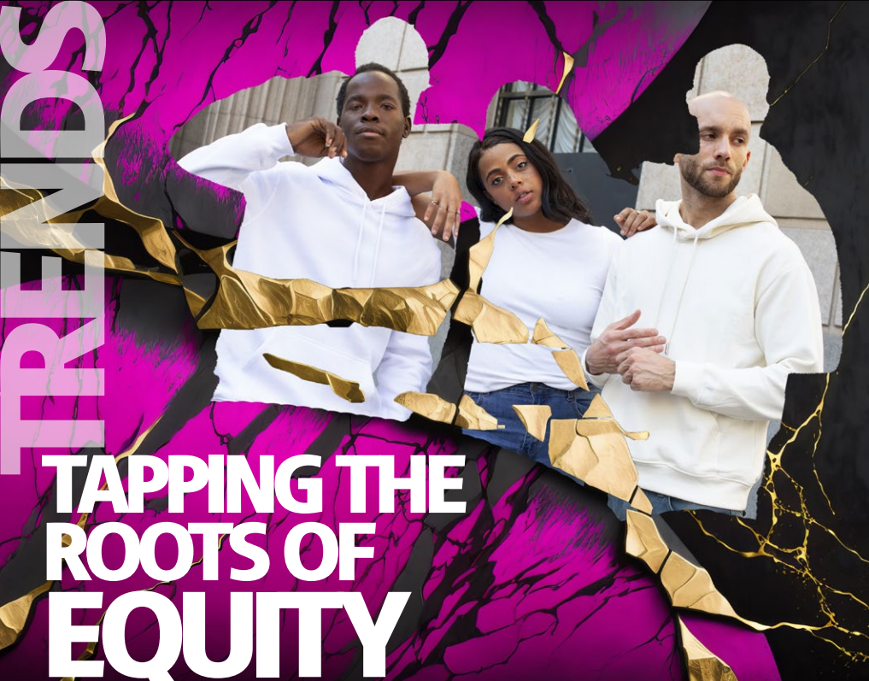Tapping the Roots of Equity:
What Diversity, Equity and Inclusion Means For
Trinbagonian Business"
By Earl AJ Edmund and James Walker of the “Roots of Equity” Podcast

LINKAGE Q1 (2024) - TRENDS
A s companies recognise the importance of creating diverse and inclusive work environments, DEI initiatives have become a top priority for businesses across industries. In this article, we explore how DEI has become a key business trend, what it means for companies operating in Trinidad and Tobago and what companies need to know to stay ahead.
Introduction
Diversity, equity and inclusion (DEI) refers to the policies and practices that promote the representation, participation, and inclusivity of people from diverse backgrounds, different races, genders, ethnicities, abilities, sexual orientations, and cultures. Companies are being asked to create a workplace culture that values and respects individual differences, encourages open communication, and fosters a sense of belonging and inclusion for all employees.
While DEI has become quite the buzzword, it is important to understand its impact on business success. S ocial issues that have captivated the world spark long-overdue conversations and inspiring calls to action. Companies are being held to different standards in their response to these issues, and the pressure to create diverse and inclusive work environments is increasing. These pressures come from a range of stakeholders including the investor community, employees, customers, suppliers and governments.
The Business Case for DEI
Many companies recognise the moral imperative of creating diverse and inclusive work environments. The business case for DEI is compelling. Research has shown that companies with diverse workforces are more innovative, more profitable, and better able to attract and retain top talent. Since 2015, McKinsey & Co.’s studies on the topic have consistently found that companies in the top quartile for gender and ethnic diversity have better financial returns above their respective national industry medians. And they’ve shown this not just in the Western World but also in countries like Egypt, Colombia and Malaysia.
In addition to the financial benefits, diverse workforces bring a range of perspectives and experiences that can lead to better decision-making and problem-solving. Companies with diverse teams are more likely to understand and meet the needs of diverse customer groups, which can lead to increased customer satisfaction and loyalty.
DEI in the Caribbean Context
Current approaches to DEI are influenced mainly by European and American perspectives. The Caribbean has its own unique and expansive cultures and subcultures, dialects, and histories that make the case for why it is simply not enough to adopt these foreign concepts. Ours is an understudied region when it comes to information and resources on how our unique experiences can create inclusive workspaces. It is important that inclusivity can be explored and expressed in our own terms as Caribbean people.
The conversation may be difficult and even awkward. One of the guests on our podcast on DEI, the “Roots of Equity” podcast, Scott Hilton-Clarke, put it well: “We need to be willing to dance in the awkward”. But as Caribbean people, we also have a lot of experience in inclusion that we may not appreciate: Trinbagonians celebrate each other’s cultures and has enshrined elements of diversity into their very watchwords and anthem.
DEI as a Business Trend for 2024 and Beyond
DEI initiatives will become increasingly important for companies in the coming years, especially for those who will be required or choose to report on their ESG performance. They will need to consider how they speak to topics of diversity and inclusion within that “S” bucket. Many of the more popular reporting standards prompt businesses towards metrics on the diversity of a company's leadership teams and board, employee demographics, and even the existence and application of diversity policies and practices.
Taking Action
Perhaps you are a small business owner and ESG reporting seems far away, or the concept of DEI seems too new or insignificant, considering all your other business challenges for 2024.
We encourage you to gift yourself the space to ask yourself, and perhaps a few others in your organisation, some simple questions such as:
● Are the decision-makers in my organisation exposed to and carefully considering a wide range of voices when making key decisions?
● Do our employees and my colleagues feel safe enough to be their authentic selves at work? Do they feel that they belong?
● Are we maximising the potential of all of our staff? Can everyone succeed at their job or might there be things that hold certain people back?
Conclusion
DEI is not merely a trend but a transformative force in the world of business, especially pertinent in the context of Trinidad and Tobago's rich cultural mosaic. This evolution from a social concept to a business imperative underlines the necessity for companies in the Caribbean to develop DEI strategies that resonate with their unique cultural, historical, and social fabric. Failing to do so will place businesses at a disadvantage and alienate a diverse workforce and customer base that values inclusivity and representation.
Embracing DEI is not about taking a moral choice; it's a strategic decision that will define the future of business success. By integrating DEI into their core strategies, companies can harness the full potential of their diverse talent, foster innovation and drive sustainable growth, ensuring they remain relevant and resilient in an increasingly diverse and dynamic global market.
ABOUT THE AUTHORS


James Walker (l) is the Host of the Roots of Equity Podcast which Earl AJ Edmund (r) produces. James is the Chief Strategy Officer for Agostini Limited, a former McKinsey and Co. consultant and leader of award-winning DEI organisations. Earl AJ Edmund is the Communications Director of The Silver Lining Foundation and the Senior Youth Development Officer at Antilles Employees Credit Union (Co-operative) Society Limited. Together, they are launching Roots of Equity, a podcast that seeks to birth a new vocabulary of diversity, equity and inclusion in the Caribbean by drawing from our own local perspectives, histories and lived experiences around being included. Visit the podcast’s website www.rootsofequity.com or visit the podcast’s social media @rootsofequitypodcast on Facebook, Instagram and LinkedIn. You may contact them via email at rootsofequity@gmail.com.